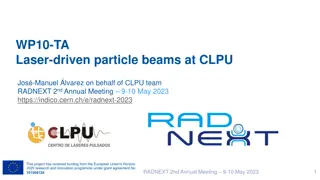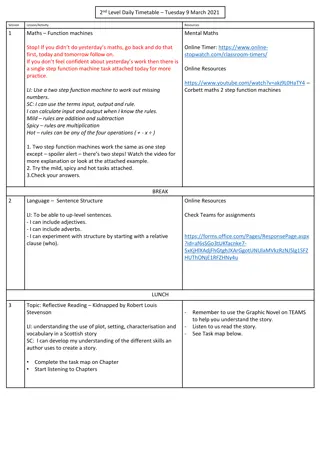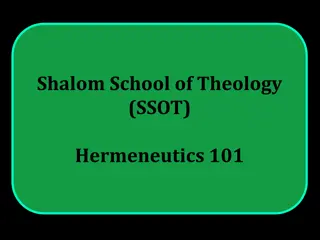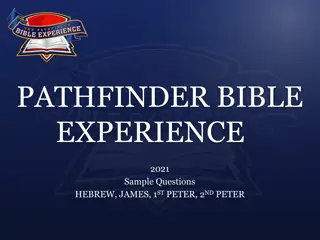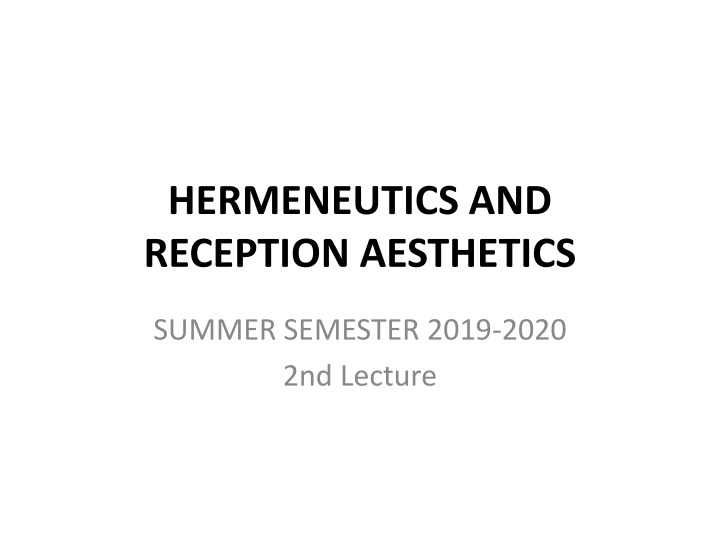
Hermeneutics and Reception Aesthetics in Summer 2019-2020 Lecture Series
Explore the fundamental concepts of hermeneutics and reception aesthetics, including the hermeneutic circle, critiques of objectivity, the influence of prejudices on understanding, and historical perspectives from Descartes to the Enlightenment. Delve into the essence of interpretation and the conditioned nature of knowledge, challenging traditional notions of objectivity and revealing the interconnectedness of our perspectives and historical contexts.
Download Presentation

Please find below an Image/Link to download the presentation.
The content on the website is provided AS IS for your information and personal use only. It may not be sold, licensed, or shared on other websites without obtaining consent from the author. If you encounter any issues during the download, it is possible that the publisher has removed the file from their server.
You are allowed to download the files provided on this website for personal or commercial use, subject to the condition that they are used lawfully. All files are the property of their respective owners.
The content on the website is provided AS IS for your information and personal use only. It may not be sold, licensed, or shared on other websites without obtaining consent from the author.
E N D
Presentation Transcript
HERMENEUTICS AND RECEPTION AESTHETICS SUMMER SEMESTER 2019-2020 2nd Lecture
Basic concepts Hermeneutics deals with texts. Text whatever phenomenon that defies simple meaning and require interpretation. whatever phenomenon that can preserve its existence throughout different periods of time and is able to instigate, on the side of viewer, a need to interpret its meaning.
Hermeneutic circle One can understand things only within the whole and never separately. No thing can be approached impartially from any timeless angle. Every knowledge whatsoever is executed from a given perspective, in given situation we somehow understand and somehow interpret.
A critique of the ideal of pure objectivity This ideal was held by modern science and most of philosophical disciplines. Against this ideal (Descartes, Enlightenment), Gadamer opposes hermeneutical approach and his main concept hermeneutical circle . One should not remove his/her prejudices and preconceived ideas, but, rather, realize them and take them into consideration.
Every understanding is conditioned by a motivation and prejudices. It is impossible to ascertain a clear field of knowledge. Prejudices are the very condition of understanding. We are thrown into the concrete historical world and this fact is not a limitation, but the very principle of understanding. Prejudices Tradition Temporal distance The principle of history of effect (Wirkungsgeschichte)
Descartes and the Enlightenment Ren Descartes, Discourse on the Method (1637) to ascertain the method that would guarantee the most certain knowledge: the true method by which to arrive at the knowledge of whatever lay within the compass of his powers
Four precepts of the method (1) The first was never to accept anything for true which I did not clearly know to be such. Methodological scepticism. (2) The second, to divide each of the difficulties under examination. Analysis. (3) The third, to conduct my thoughts in such order that, by commencing with objects the simplest and easiest to know, I might ascend by little and little to the knowledge of the more complex. Synthesis. (4) And the last, in every case to make enumerations and reviews so general, that I might be assured that nothing was omitted.
Two different approaches 1. modern method (Descartes, the Enlightenment) Destruction of a current state of affairs, separation from all tradition. 2. hermeneutic understanding (Schleiermacher, Heidegger, Gadamer, Ricoeur) One should not remove his/her prejudices and preconceived ideas, but, rather, realize them and take them into consideration.
Relation between subject and object Extremes: (1) Reduction to object - objectivistic science (i.e. mechanistic (meta-)physics). World is conceived as a complex of objects which have clearly definable properties. Subject is sidelined. (2) Reduction to subject - the outer world is only illusion or product of one s mind solipsistic idealism, relativism
Intentionality basic characteristic of our consciousness, it characterizes the correlative relation between the object and the subject. It focuses on the way how the object is given to our mind. Edmund Husserl (1859 1938); main works: Logical Investigations (1900-1901), Ideas Pertaining to a Pure Phenomenology and to a Phenomenological Philosophy (1912-13), Crisis of the European Sciences and Transcendental Phenomenology (unfinished work, published after death).


